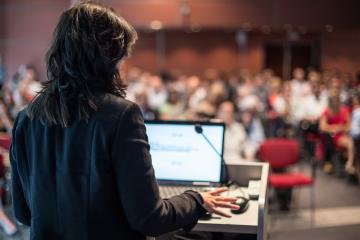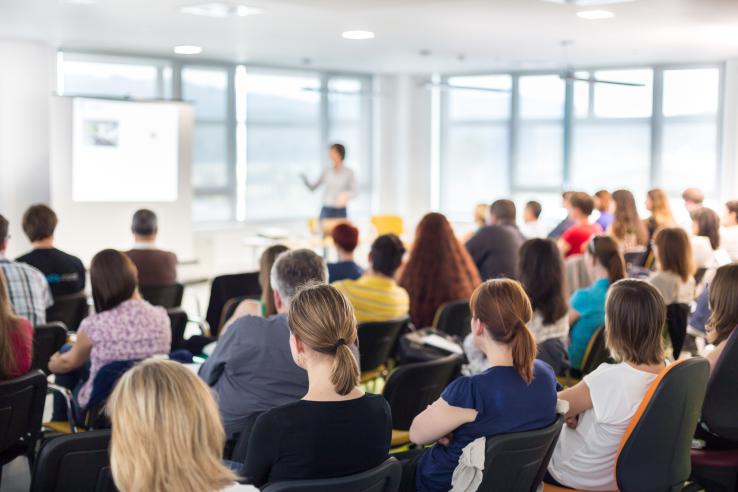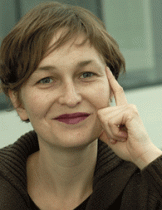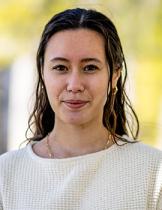
Fostering inclusion in economics: Marianne Bertrand on addressing professional conduct with the American Economics Association

Economics, as a tool to improve policy and serve communities, is at its most powerful when it includes everyone. Therefore, our work at J-PAL is better when it represents as many perspectives as possible, and we all miss out on key insights when it doesn’t. In this series, we speak to J-PAL-affiliated researchers who are working to cultivate an environment where economists of all backgrounds are able to contribute to the quality and credibility of the field, and also feel safe and valued. Part two features Alicia Sasser-Modestino on gender dynamics of economics seminars; part three features Matt Notowidigdo on the value of mentorship programs.
In part one, we sat down with Marianne Bertrand (University of Chicago Booth School of Business) about addressing professional conduct with the American Economics Association (AEA). Dr. Bertrand chairs the AEA’s Committee on Equity, Diversity, and Professional Conduct and, in that role, has led efforts to characterize and address discrimination within the association. In this post, she discusses these efforts and the future of inclusivity within the AEA.
Why do you think fostering greater inclusion in the field of economics is important?
I believe that the questions we end up working on become richer when the field is more diverse. The ideas and solutions that one thinks about are very much influenced by lived experiences, so the quality and creativity of our work as economists is only going to get better when we have increased inclusion. Take gender for example: as more women entered the field, we saw more questions related to public policy, such as those on topics of health, labor, etc. But we have a long way to go—we could see even more women and more racial diversity in the field.
You are the chair of the AEA Committee on Equity, Diversity, and Professional Conduct, which carried out a Professional Climate Survey, published in 2019. Could you tell me about the survey?
The survey came about in light of a set of incidents and issues in the months preceding, which were a wake-up call for the Association.
Before I get into the results, I want to caveat that we only got roughly a twenty percent response rate. That means the conclusions that we can draw are limited. Putting that aside, it was very clear from the survey that the profession is not working as well for women, people of color, people with disabilities, and people in the LGBTQ+ community. All minoritized groups seem to be having a worse time in the profession and not feeling a sense of belonging or feeling like they've been discriminated against.
At the time, the results did surprise me—I did not recognize how bad the culture was for many groups. I feel like, personally, I've been protected—or maybe lucky is a better word. The one exception I always felt quite strongly about is the level of aggressivity in this profession, particularly around seminar culture. When people present papers, there are often people in the audience that are trying to make their points on which the speaker is wrong, sometimes rightly so, but it’s sometimes quite aggressive. Of course, not all economics departments or schools are the same. But I believe that we have more of that aggressivity than other professions, and that was reflected in the survey.
What was the reaction to the survey results?
The survey generated more conversations in economics departments about the problems that needed to be addressed. I don’t have full visibility on everything that happened, but within my own institution, we thought about ways we could change the recruiting process and ways to change the seminar culture—keeping it lively and intellectually stimulating, but without the unnecessary aggressivity.
At the level of the AEA, the survey was one of the early steps in a sea of efforts. I’ve been very impressed by the Executive Committee’s commitment to taking action. Preceding the survey was a code of conduct, which we didn’t have before. And then after the survey results emerged, they put an ombudsperson in place and created two working groups.
One working group was created to improve the pathways into economics and make them more diverse. Through this work, for example, people started volunteering their time doing outreach to high schools trying to sell the idea that economics can be of interest to a broader and more diverse set of people. The second working group put together a set of best practices based on the fabulous research that exists on building a more inclusive profession and tried to make recommendations to people about how they can be better advisors and better colleagues. Now there are more efforts to ensure that people are reading and adopting those practices.
We’re also creating new awards at the AEA that celebrate people that are good mentors or are innovative in how they teach economics. The AEA is trying to demonstrate that what makes a good economist is not just the quality of their research, but the services they provide to make the profession more inclusive.
What actions would you like to continue to see taken by the AEA to advance inclusion in the field?
I would like to see more actions targeting elitism in economics. There is a feeling that the same group of people that belong to top schools are respected, invited to seminars, and see their work published in top journals. For those that are not part of that select group, that creates a clear sense of dissatisfaction. There’s more we could do to understand the source of this resentment and whether there's more that can be done.
How do you think J-PAL can contribute to advancing inclusion in economics?
The field experiments that J-PAL specializes in are spot on when it comes to understanding the kind of policies and practices that are consistent with more racial equity. For example, randomized evaluations have been used to demonstrate the effectiveness of mentoring programs. There’s a lot of experiments by psychologists and sociologists in lab settings that could be naturally taken to the field. It’s an area that could produce a rich research agenda with great social value. For example, there have been many investments lately in programs such as de-biasing training. J-PAL is in a great position to understand whether that money is really well spent.



